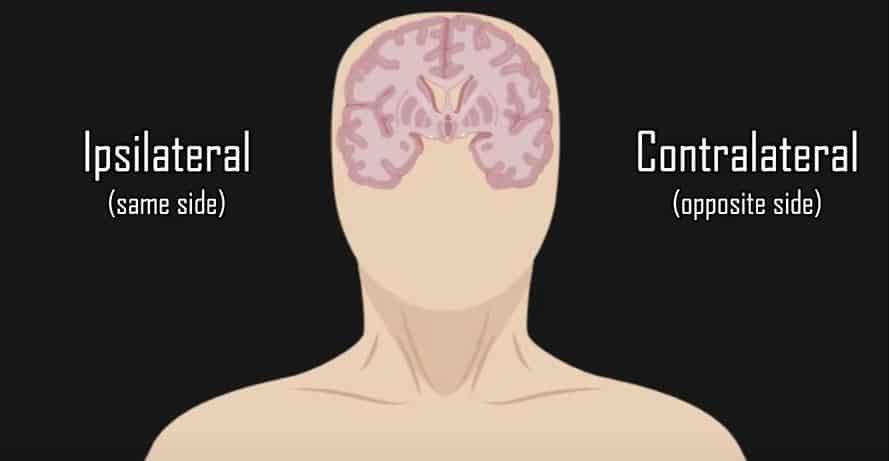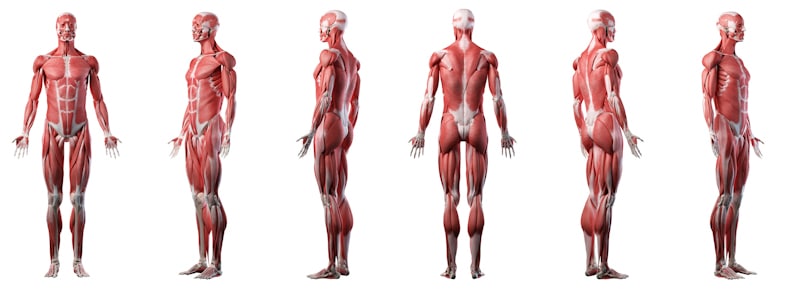Sometimes we hear our doctor, coach, or science teacher talk about the “ipsilateral muscle.” But sometimes, we hear the term “contralateral muscle” mentioned on other similar occasions. However, what do these two words mean?

The word “ipsilateral” refers to an action or thing that appears or affects the same side of the body. On the other hand, the term “contralateral” refers to an action or object found or involving the other side of the body. Therefore, both words are antonyms because they have opposite meanings.
Keep reading this article if you want to know more about the definitions, examples, etymologies, and synonyms of both words.
Definition Of Ipsilateral
Ipsilateral means “on the same side.” It refers to something situated on or that affects the same side of the body. Commonly, we use the term to refer to a part of the body in anatomy or medicine.
Here we can see some examples of the term:
- Scratching the inside of the hand can cause ipsilateral contractions in the forearm muscles.
- The ipsilateral fracture occurred due to a weak ankle. The ankle can be weakened by poor walking posture or by wearing high-heeled shoes.
- When the doctors found the tumor in the location suggested by the scan, it was removed and biopsied from the normal ipsilateral parathyroid gland.
- The effect is ipsilateral, meaning that the suppression of Mullerian development occurs in each testicle on its same side.
- The scapular neck and the ipsilateral clavicle fracture are commonly known as the “floating shoulder.”
- As a variant for Wallenberg syndrome, we can consider the Opalski syndrome. The presence of ipsilateral hemiplegia in the former represents the difference.
- With spinal cord injuries, the deficit in pain perception is contralateral to the injury. The other deficits, however, are ipsilateral.
Definition Of Contralateral
Contralateral means “the opposite side.” It refers to something that is happening or causing some effect on two opposing parts of a body. The term, like the previous one, is commonly used in anatomy and medicine.
A few examples of how to use the word are:
- Besides the danger of contralateral neoplasia, women with the disease are at risk of local recurrence or developing a new primary cancer in the breast that has been preserved.
- The result is positive if the contralateral leg is flexed at the knee and lifted off the table.
- I will do academic work to determine the contralateral metachronous primary cancer.
- No pregnancy contralateral to the location of the corpus luteum was observed.
- We have not checked the contralateral side of the neck in the patients who arrived at the hospital yesterday.
- We must repair the contralateral testicular deformity in surgery to avoid a recurrence.
- When you recover from a car accident, you need to exercise the contralateral leg muscle to strengthen your body.
The Etymology of Both Terms
Ipsilateral
The word “ipsilateral” comes from the Latin combination of “ipsi,” which means self, and “later,” which means side. Therefore, if we translate the sentence literally, it would mean the same side.
Contralateral
The word “contralateral” is formed from the Latin combination of “contra,” which means another, and “later,” which means side. Therefore, the translation of the sentence would be the other side, literally speaking.
Synonyms Of Ipsilateral
The only word that can be substituted for “ipsilateral” without changing its meaning is “homolateral.” Since the word is a term used specifically in science, other terms can alter the context of the situation.
“Homolateral” also means something on the same side or that affects the same side.
Some examples of using the word are:
- The fire caused a homolateral facial deformity that cannot be subjected to surgery. As a surgeon, I would recommend seeing a dermatology specialist to treat your case.
- We had to remove the homolateral rib of the left leg, as the lady had a deformity in her body that caused a hernia.
- The patient’s homolateral part of the brain and cerebellum is not responding as expected to treatments, so it is necessary to stay in the hospital for at least three more weeks.
- The recent study reports 500 patients with bronchopulmonary cancer associated with homolateral pleural effusion. The cause of this mysterious outbreak is unknown, but we are investigating a possible epidemic.
- Two years ago, I was sitting watching TV on my couch, and when I stood up, I couldn’t stretch my right leg or fully extend my right arm. I went to the doctor and discovered the problem: I developed a homolateral paresis. Since then, I go to therapy every week, and I see incredible progress like pain-free walking.
- The virus triggered pneumonia in my father in the left lung, and the homolateral internal organs are not working correctly. The doctor recommended blood tests, X-rays, and rest until the results are ready and he can determine what the best course of action is for my father. I am perturbed because he has diabetes and arthritis as well.
- The car accident caused homolateral paralysis from the legs to the shoulders. She has not been able to get out of bed and cannot eat on her own. But the most significant damage was psychological: he has depression, anxiety, and post-traumatic stress.
Synonyms Of Contralateral
The closest synonym to “contralateral” is “bilateral” because the two terms refer to something that occurs or is affecting both sides. The difference is that “contralateral” is usually used in medicine and anatomy. In contrast, you can use “bilateral” to refer to other disciplines, such as political science, communication science, mathematics, among others.
Some examples of the use of the word are:
- Bilateral arthritis affects the joints on both sides: shoulders, elbows, wrists, knees, and ankles.
- Lung cancer has spread bilaterally in the patient’s lungs. It is no longer possible to perform an extraction, so the only option is to wait and continue with the treatment.
- Due to a genetic disease, at the age of 25, we will have to perform a bilateral operation on his arms and legs. If you do the right therapy, you could avoid going to surgery.
- My doctor detected a bilateral inguinal hernia. He also told me that the cause of this type of hernia could be increased pressure within the abdomen, a pre-existing weak point in the abdominal wall, straining when defecating or urinating, strenuous activities, pregnancy, and chronic coughing or sneezing.
- My grandmother had bilateral plagues and cavities on her molars and had complications for many years. The solution was to carry out the extraction of the molars and replace them with prostheses. Now he does not have any problems with his teeth, but he must go to the dentist monthly to check the condition of the prostheses.
- The doctors discovered my uncle had bilateral kidney cancer. When they opened him up to check the severity of cancer and see what they could do, they found that it was already too developed. So they prescribed pills and rest, and they diagnosed him with three more months to live. That was three years ago, and my uncle is still with us. Cancer completely disappeared due to the treatments. It is a miracle!
- I know a person who was in a car accident that caused a bilateral rib fracture. He has been recovering for two months and states that he feels more substantial than before the accident due to the rest and care. However, sometimes he cannot sleep without pills due to pain or cannot get out of bed independently.
Conclusion
The terms “ipsilateral” and “contralateral” are antonyms, and we should use them in anatomy. Avoid using them to refer to objects or situations that fall outside of the health area, as you may misuse them.
Shawn Manaher is the founder and CEO of The Content Authority. He’s one part content manager, one part writing ninja organizer, and two parts leader of top content creators. You don’t even want to know what he calls pancakes.


